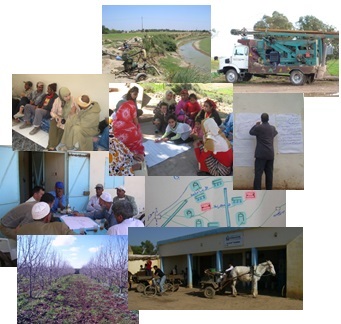Mohamed Lamine Ouendeno
DOI: https://doi.org/10.60569/9-a1
Résumé
Le métayage est un mode d’exploitation agricole dans lequel le propriétaire foncier et le métayer se partagent la production dans des proportions fixées par contrat. L’objectif de cet article est d’analyser le contenu des contrats de métayage, la nature des conflits qui surgissent et les modes d’arbitrage adoptés par les parties contractantes dans le cas des cultures maraîchères sous serres dans une région saharienne. L’analyse exploite les données empiriques collectées grâce aux enquêtes exploratoires (20 individus) et systématiques par questionnaire auprès d’un échantillon de 100 exploitations agricoles, dans la commune d’El-Ghrous, wilaya de Biskra (Algérie), caractérisée par une forte croissance de la production maraîchère et phœnicicole, durant les deux dernières décennies. L’échantillonnage s’est fait selon une approche spatiale, basé sur un zonage raisonné, de manière à avoir des personnes répartis sur toute la commune. L’enquête a été effectuée durant les périodes 2013 et 2016/2017. Cette analyse fait ressortir trois principaux résultats : (i) le contrat de métayage, dans ce contexte, est de deux formes : un simple contrat de travail sans dimension foncière où le métayer n’apporte que sa force de travail et de son expertise (savoir-faire), sans pouvoir de décisions dans la ferme ; ou bien une forme de « partenariat limité » dans laquelle il participe à la prise de décision sans contribution aux coûts de production ; (ii) Les termes du contrat du métayage sont connus et acceptés par tous les acteurs ce qui réduit la marge de négociation et de modification de ces termes ; et (iii) Et la mobilisation de la coutume et des règles locales ont rendu le contrat du métayage plus efficace et moins conflictuel. Cependant, la rareté de la main d’œuvre agricole, affectant plus spécialement le maraîchage sous serre, pourrait faire évoluer les termes de contrats de métayage au profit des exploitants tout en leur conférant plus de pouvoir de décision.
مؤسسة المزارعة بالزيبان (الجزائر) ودورها في تطوير زراعة البيوت البلاستيكية
ملخص
الزراعة بالمشاركة هي طريقة للزراعة يتقاسم فيها مالك الأرض والمزارع الإنتاج بنسب محددة بموجب عقد. الهدف من هذه المقالة هو تحليل محتوى عقود المشاركة وطبيعة الخلافات التي تنشأ وطرق التحكيم المعتمدة من قبل الأطراف المتعاقدة في حالة محاصيل الخضر الدفيئة في منطقة الصحراء. يستخدم التحليل البيانات التجريبية التي تم جمعها من خلال المسوحات الاستكشافية (20 فرد) وكذا عن طريق استبيان مع عينة من 100 مزارع، ببلدية الغروس بولاية بسكرة (الجزائر). العينات مصنوعة وفقًا لنهج مكاني، قائم على تقسيم منطقي، بحيث يكون هناك أشخاص موزعون على جميع أنحاء البلدية. تم إجراء المسح خلال الفترتين 2013 و2016/2017. يبرز التحليل ثلاث نتائج رئيسية: (1) عقد المشاركة في المحصول هو عقد عمل بسيط حيث لا يجلب المزارع إلا قوته العاملة وخبرته (الدراية)؛ ليس لديه سلطة اتخاذ القرار في المزرعة؛ (2) شروط عقد المشاركة في المحصول معروفة ومقبولة من قبل جميع الجهات الفاعلة، مما يقلل من هامش التفاوض وتعديل هذه الشروط؛ و (3) وتعبئة العرف والقواعد المحلية جعل عقد المشاركة أكثر كفاءة وأقل تصادمية. ومع ذلك، فإن ندرة اليد العاملة الزراعية، الذي يؤثر بشكل أكثر تحديدًا على زراعة الخضروات في البيوت البلاستيكية، يمكن أن يغير شروط عقود المشاركة في المحصول لصالح المزارعين مع منحهم المزيد من الصلاحيات اتخاذ القرار في المزرعة.
الكلمات المفتاحية : المشاركة في المحصول ، عقد العمل ، الخضروات في البيوت المحمية ، الاتفاقيات ، الترتيبات التعاقدية، الزيبان، الجزائر.
The institution of sharecropping in Ziban (Algeria) and the development of market gardening in greenhouses
Sharecropping is a form of farming in which the landowner and the sharecropper share production in proportions fixed by contract. The aim of this article is to analyse the content of sharecropping contracts, the nature of the conflicts that arise and the methods of arbitration adopted by the contracting parties in the case of market gardening in greenhouses in a Saharan region. The analysis is based on empirical data collected through an exploratory survey (20 individuals) and a broad one (sample of 100 farms) in the municipality of El-Ghrous, wilaya of Biskra (Algeria), which has experienced strong growth in vegetable and fruit production over the past two decades. Sampling was carried out using a spatial approach, based on reasoned zoning, so as to interview farmers located in different areas of the municipality. The survey was carried out during the periods 2013 and 2016/2017. This analysis highlights three main results: (i) the sharecropping contract, in this context, takes two forms: a simple labour contract, with no land dimension, where the tenant contributes only his labour and expertise (know-how); he has no decision-making powers on the farm, and a second form of sharecropping as a « limited partnership ». In this case, the tenant farmer participates in decision-making but does not share in production costs. This type of contract marks the boundary between an implicit wage relationship, with no involvement in decision-making or production costs, and the partnership contract proper, which includes these two elements. (ii) the terms of the sharecropping contract are known and accepted by all the players, which reduces the scope for negotiation and modification of these terms; and (iii) the use of custom and local rules have made sharecropping contract more effective and less conflictual. However, the scarcity of farm labour, which affects greenhouse market gardening in particular, could lead to changes in the terms of sharecropping contracts to the benefit of the sharecroppers, while giving them more decision-making power.
Keywords: Algeria, contractual agreement, employment contract, limited partnership, greenhouse market gardening, sharecropping, Ziban, Algeria.
